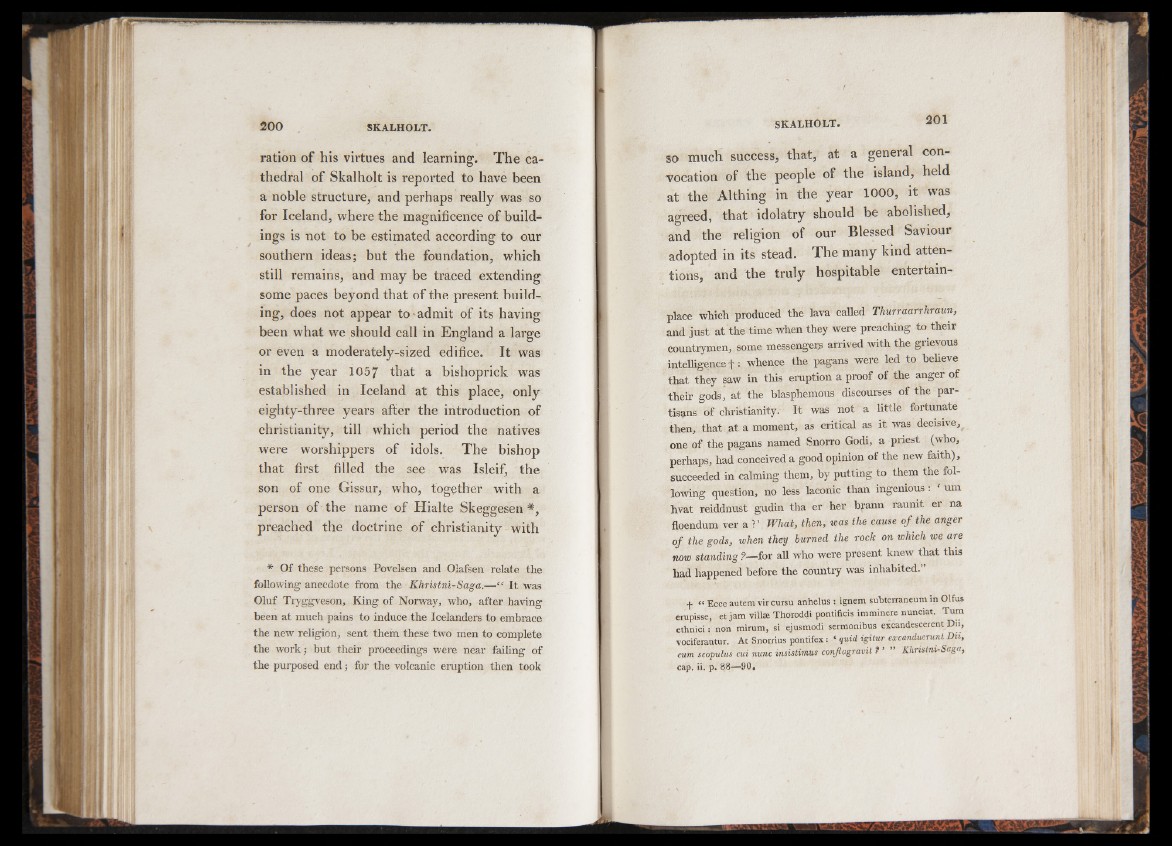
ration of his virtues and learning. The cathedral
of Skalholt is reported to have been
a noble structure, and perhaps really was so
for Iceland, where the magnificence of build-*
ings is not to be estimated according to our
southern ideas; but the foundation, which
still remains, and may be traced extending
some paces beyond that of the present building,
does not appear to-admit of its having
been what we should call in England a large
or even a moderately-sized edifice. It was
in the year 1057 that a bishoprick was
established in Iceland at this place, only
eighty-three years after the introduction of
Christianity, till which period the natives
were worshippers of idols. The bishop
that first filled the see was Isleif, the
son of one Gissur, who, together with a
person of the name of Hialte Skeggesen *,
preached the doctrine of Christianity with
* Of these persons Povelsen and Olafsen relate the
following anecdote from the Khristni-Saga.— “ It was
Oluf Tryggveson, King of Norway, who, after having
been at much pains to induce the Icelanders to embrace
the new religion, sent them these two men to complete
the work; but their proceedings were near failing of
the purposed end; for the volcanic eruption then took
so much success, that, at a general convocation
of the people of the island, held
at the Althing in the year 1000, it was
agreed, that idolatry should be abolished,
and the religion of our Blessed Saviour
adopted in its stead. The many kind attentions,
and the truly hospitable entertamplace
which produced the lava called Thurraanhraun,
and just at the time when they were preaching to their
countrymen, some messengers arrived with the grievous
intelligence +: whence the pagans were led to believe
that they saw in this eruption a proof of the anger o f
their gods, at the blasphemous discourses of the partisans
of Christianity. It was not a little fortunate
then, that at a moment, as critical as it was decisive^
one of the pagans named Snorro Godi, a priest (who,
perhaps, had conceived a good opinion of the new faith),
succeeded in calming them, by putting to them the following
question, no less laconic than ingenious : f um
hvat reiddnust gudin tha er her brann raunit er na
floendum ver a V What, then, was the cause of the anger
of the gods, when they burned the roclc on which we are
now standing ?—for all who were present knew that this
had happened before the country was inhabited.
“ Ecce autem vir cursu anhelus : ignem subterraneum in Olfus
erupisse, et jam villæ Thoroddi pontificis imminere nunciat. Turn
ethnici : non mirum, si ejusmodi sermonibus excandescerent Dii,
vociferantur. At Snorrius pontifex : * quid igitur excanduerunt Dn,
cum scopulus cui nunc insistimus conjiagravit ? ' ” Kliristm-Saga,
cap. ii. p. 88—90,